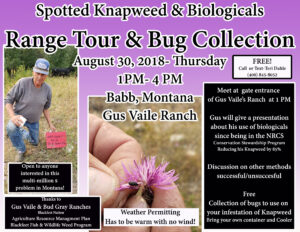Final report for EW18-027
Project Information
The “Building Internal Capacity for the Blackfeet Tribe Agricultural Resource Management Plan
(ARMP)” project aims to build internal capacity by further professionalizing the existing
workforce through classroom and field courses and attendance of professional conferences, and
support sustainable agricultural practices through a Sustainable Agriculture Train-the-Trainer
course series delivered through the MSU Tribal Extension Office. These trainings are aligned
with the goals of the ARMP, which intends to improve economic conditions and political
sovereignty of the Tribe by building the agricultural industry on the Reservation and
implementing holistic, food sovereignty projects that connect agriculture with community health.
By building capacity internally, the Tribe can ensure the success of projects managed by
dedicated professionals who are attuned to realities on the reservation, cultural, political,
climatic, or otherwise. Anticipate outcomes include train the trainer curriculum materials that
may be adapted to other tribal communities and courses that tribal producers may attend to gain
exposure to new techniques and solutions to existing challenges.
(Objective 1): Further professionalize the core ARMP agricultural professionals to meet
the goals and objectives of the ARMP through professional society conferences and
workshops and distance and field courses focused on project management and other
sustainable agriculture content (Tribe, ARMP PI, MSU).
(Objective 2): Development and delivery of a sustainable agricultural focused, Extension
sponsored, Train-the-Trainer series that will benefit the full ARMP team and producers.
Cooperators
- (Educator)
- (Educator)
- (Educator)
- (Educator)
Education
Build internal capacity by further professionalizing the existing
workforce through classroom and field courses and attendance of professional conferences, and
support sustainable agricultural practices through a Sustainable Agriculture Train-the-Trainer
course series delivered through the MSU Tribal Extension Office.
Education & Outreach Initiatives
To teach local land owners, producers, farmers and growers about biological invasive species management, mitigation and application.

All participants left with information and practical implementation strategies for biological invasive species management. The participants consisted of farmers, ranchers, and Blackfeet Community College students.
This FSMA training course was developed by the Food Safety Preventive Controls Alliance (FSPCA) and is the “standardized curriculum” recognized by FDA.
This course is specifically designed to follow the requirements set forth by the US Food & Drug Administration (FDA) to meet Food Safety Modernization Act (FSMA) criteria for Preventive Controls Qualified Individual.
As an essential role within a food processing facility, the preventive controls qualified individual is crucial to the management and preparation of the food safety plan, validation of preventive controls and more.
Companies subject to this rule must ensure that their food safety system is developed and applied by an individual who has successfully completed training in the development and application of risk-based preventive controls.
As a leader in professional training, we offer you unrivaled expertise in the requirements for becoming a preventive controls qualified individual, as well as in-depth knowledge of the standardized curriculum recognized by FDA.
Two ARMP planning team members were trained and then certified to train on the implementation of the Food Safety Modernization Act (FSMA). The training curriculum was developed by Cornell University and is required in all FSMA training. This training was offered to Blackfeet growers to ensure they are in compliance with the provisions around food safety for commercial produce production. The two ARMP trainers also participated on the working group to customize the FSMA curriculum to align it with the jurisdictional complexities of Indian Trust Land management functions and the challenges associated with growing on Trust lands. The Blackfeet ARMP partnered with the University of Arkansas - Indigenous Food and Agriculture Initiative on both efforts, the FSMA training and participation on the working group to customize the FSMA curriculum to ensure it included Indian Trust Land provisions.
You can find the training flyer here: FSMA_flyer_MT
Trained ten growers or people interested in commercial produce production.
Educational & Outreach Activities
Participation summary:
Learning Outcomes
Project Outcomes
Travel and employee training opportunities afforded by the WSARE funding allowed our programmatic staff to spread the mission of the Blackfeet ARMP to over 50 new venues and audiences. This opportunity has allowed us to share not only the progress that our program has made, but each presentation offers documentation on how our ARMP has been developed with the community. This offers a translational model for participants to emulate for development of their own internal ARMPs, or other holistic resource conservation management plans.
Of the 5,000 people that we reached, approximately 500 were agriculture professionals, agriculture producers or farmers. Because our effort was resulting in the first internally developed agriculture management plan for Tribes, our efforts under this grant afforded us the ability to influence Blackfeet and many other agriculture professionals across the country. Both numbers are estimates as many venues where we shared our methodologies and implementation strategies were meetings not sponsored by us so we had not control over the sign in sheets or inventory of participants, however, both numbers also reflect the very low end of the number of people we reached which far exceeds our obligations under this grant.
Success Stories
Our outreach through presentation activities allowed us to gather partnerships such as National Center for Appropriate Technology (NCAT) and Indian Nations Conservation Alliance (INCA). Through these partnerships we were able to bring staff from NCAT and interns from INCA to a local producer’s fields to investigate new types of crops being grown on his land. The staff from NCAT include highly trained professionals in Western-centric agriculture resource management and the INCA interns were Blackfeet youth. By engaging audiences around the U.S. due to funding from WSARE, we were able to create a day wherein local youth engage with producers and professionals to develop connections that will last them lifetimes.